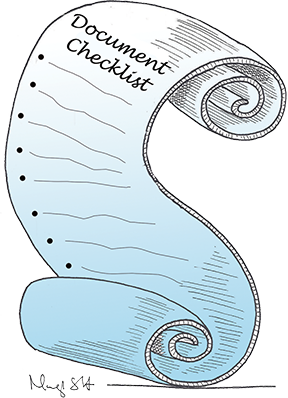
Jump to:

Legal Agreements for Families and Caregivers
There are an estimated 53 million adult caregivers in the United States and nearly one in five (19%) are providing unpaid care to an adult
Guides for “Managing Someone Else’s Money”
The “Managing Someone Else’s Money” guides can help you understand your role as a financial caregiver, also called a fiduciary. Each guide explains your responsibilities
Financial Documents: What to Keep and What to Toss
Keep these financial documents in a box or file cabinet at home: The last 7 years of your tax returns (state and federal) With each
Important Legal and Financial Documents for your Spouse
A Caregiver Agreement is a formal contract that states what care is to be provided and how much the caregiver will be compensated. This is a useful contract for a family or non-family caregiver. The agreement should include the date care begins, detailed description of services, schedule of services, how long the agreement is in effect, location where services will be provided, a statement that the terms of the agreement can be modified by mutual agreement (in writing) of the parties involved, and signatures by the parties and date agreement was signed. If it is possible that the person may need to apply for Medicaid, an attorney in the state the person lives should be consulted to assure the caregiver agreement satisfies the state specific requirements for Medicaid.
A Durable Power of Attorney is a legal document in which you are appointed to act on behalf of your spouse and to manage their financial matters. If your spouse becomes incapacitated, the person they name (as the agent) has the authority to make financial decisions for your spouse (the principal). The Durable Power of Attorney is effective until your spouse dies or until they decide to revoke it. Power of Attorney law is state specific, the ABA Commission on Law and Aging has a listing of state power of attorney laws. A Power of Attorney is a very powerful document, also see the tip sheet Five Safeguards to Consider Adding to Any Power of Attorney for Finances.
A Health Care Power of Attorney—or Durable Medical Power of Attorney or Health Care Proxy— is a legal document used to appoint a person to make decisions on behalf of another person. If your spouse is unable to make those decisions for him or herself, a health care proxy can make sure that health care providers follow their wishes even if a medical condition changes. Hospitals, doctors, and other health care providers must follow the healthcare proxy. Your spouse may give you as little or as much authority as they want, i.e., your spouse may allow you to make all health care decisions or only certain ones.
A Living Will serves as a written declaration of your spouse’s health care wishes when they cannot communicate them personally. It explains a spouse’s health care preferences and instructs their doctor about any end-of-life decisions. (NOTE: In some states a Living Will is not used to name a proxy. In those states, you must name your proxy in a separate Health Care Proxy.)
It is advisable to have both a Health Care Proxy and Living Will. A caregiver with their loved one’s Health Care Proxy or Power of Attorney for health care is designated to make decisions, based on their instructions, if and when the spouse is unable to speak for him or herself. A Living Will specifically outlines decisions about the health care treatment they want near the end of life. Together, the two documents can work to make your spouse’s health care wishes clear and guarantee those wishes are carried out.
Last Will and Testament is a legal document that gives directions about where and to whom your spouse’s assets should go after you die. You may be named an “executor” to carry out your spouse’s directions as stated in the will.
Living Trust (different from a Living Will) is a legal document that allows your spouse, or anyone they name as trustee, to transfer ownership or title of assets into a trust. But they keep control of those assets throughout their lifetime. A Living Trust names recipients of assets (heirs) from the trust when your spouse die. A living trust allows heirs to avoid probate, the court process by which a will is determined to be valid or invalid.
When caring for someone, you should know where the following documents are located, and keep them organized:
❏ Medical records
❏ Birth Certificate
❏ Social Security benefit/payment information
❏ Medicare and Medigap policy information
❏ Insurance policies (health, life, home, auto, etc.)
❏ Pension, 401(k) and other income related benefit statements
❏ Bank statements
❏ Loan agreements
❏ Investment statements (IRAs, mutual funds, etc.)
❏ Stock and bond certificates and statements
❏ Mortgage papers
❏ Deeds
❏ Tax Records
❏ Tax receipts and relevant documents needed for tax filing
❏ State and Federal income tax returns
❏ Vehicle titles
Healthcare Values
You will find it helpful to discuss with your spouse what their health care values are. Values are strongly held, long term beliefs that shape our decision making. The ABA Commission on Law and Aging recommends several tools to help your spouse develop and discuss their health care values. Find the tools here.
The Role of Fiduciary
If your spouse designates you as their Health Care Proxy or Power of Attorney, you are a fiduciary. To learn more about the role and responsibilities of a fiduciary, visit the Consumer Financial Protection Bureau to view their guides on managing someone else’s money. These guides provide information on navigating fiduciary roles such as power of attorney, trustee, and more.
Organizing Documents
AARP has developed a useful document that can be used to list records, their locations, and contact information for professionals such as accountants, clergy, etc.
